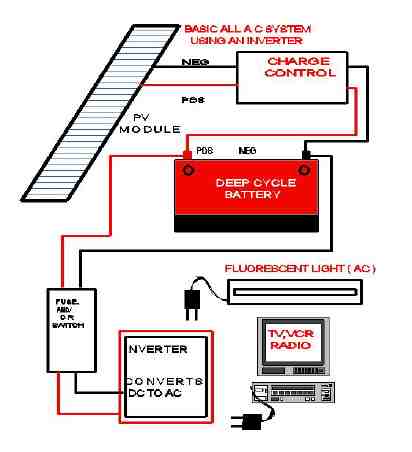
Small PV System
So, you want to go off-grid? Or maybe you want to find out what it’s like before taking the plunge? How about taking one room of your house off-grid? It’s a less expensive way of learning the technology, before committing yourself.
We suggest starting with a bedroom. Look around your bedroom and see what devices you have that run on electric. As I look around my room, I see one table lamp, two floor lamps, wall lamp, digital TV, Stereo, satellite box, portable dvd player, vcr, and XBox. I also have a battery powered clock, powered by rechargeables, so I

10 Responses
BUT if you go totally off the grid you will save so much more, at least here in Rochester NY. We are charged just for being a customer! ($40/mo) AND we get charged for being issued a bill! I HATE RG&E. I want off the grid SO badly!
First, forget Koyoto one giant scam on mankind. second go solar in one room. do it for the chance to become independent of your money grubbing electric company. It’s also great for emergencys and power outages.
Allright bastards, you censored my post about your naive idea about batteries lasting 40 years. Now I know all that’s on your web is crap and you are worthless little nazis.
Another thing to factor in that optimistic payback time: The most expensive item, the batteries, won’t last 40 years. You’ll have to buy another set at least twice in 40 years.
First time iv see a start to finish exercise on building a renewable system from scratch . I will be saving the page for future reference!
I have done a similar thing in an effort to start “going green” I started by getting a UNI-SOLAR US-64 64 watt panel because I just had to get something. I could run a 4″ muffin fan and that was neat but then I decided I wanted to be able to charge a battery. I got a deep cycle marine battery and then realized it was already charged so I still had nothing to charge. I decided I could use the 12 volt Malibu lawn lights that the previous owner left at the house as a load so I made a light sensor that works on 12VDC to run the lights and hooked them to my battery. I added a 12VDC Malibu spot to the system to shine on my American flag at night also. I had a working system. My main goal is to get off oil so I am trying hard to make heat. I made a couple of solar air heating boxes. Piped them into the house and garage with 6″ flexible insulated heating duct. I put a draft blocker used in dryer and bathroom vent systems in the intake to act like a check valve and stop reverse thermosiphoning at night and a couple of 12VDC fans to suck air through the box and blow it into the basement or garage. I made a little circuit that runs on 12VDC for each of the boxes that compares the temp in the box to the temp in the space to be heated and turns on the fans when the box is hotter than the space using power from the battery. The other day I was sucking 56 degree air off the basement floor into the box outside where it was cold and then back into the house and my output high temp for the day was 88 degrees. The fans do about 100CFM. All powered by the sun. I have provided my website address in case you want to check it out. My next goal is to add a windmill to the system to help charge the battery because it always seems to be windy when it’s not sunny.
That is all for now.
https://home.comcast.net/~bigvid
I think your financial calculations are over simplified. You’re ignoring the role of interest rates, which are essential to any serious discussion of ‘payback times’. This is because you could have taken your $1300, invested it in a savings account or bond and offset the interest payments against your electric bills.
In your case, you annually save $0.09 * 365 = $32.85. This corresponds to an interest rate of only 2.5% on your $1300. If you can invest your money at a better rate than this, then you’re actually *losing* money by going off-grid.
If you’re doing this for environmental reasons, you might be better off switching to a ‘greener’ supplier, something like ecotricity.co.uk, as they can at least benefit from economies of scale.
I am all for getting off-grid but the numbers above are off a bit. Here in St. Louis we pay only 5 cents per KWH so payback is 120 years. I’d like to know what the expected lifetime of the off-grid components is. Which one will fail first?
Thanks for a thoughtful article.
This is a great article. I know my visitors could use this information. Going off-grid can be scary doing it all at once.
Thank you for giving formulas in language the technologically challenged can understand!! I am going to figure out my household needs asap.